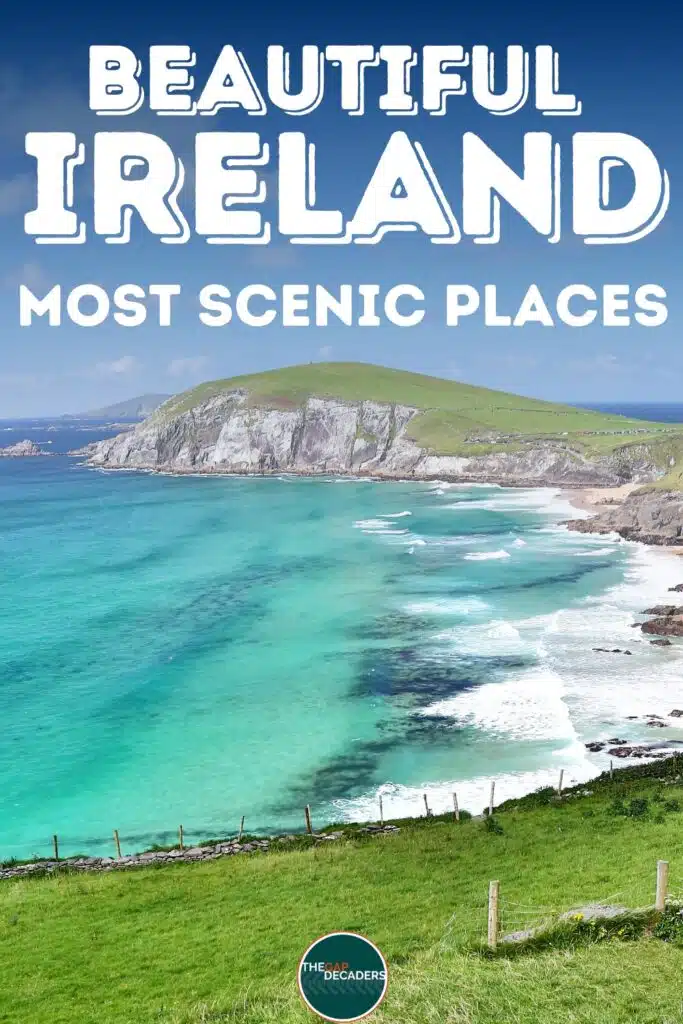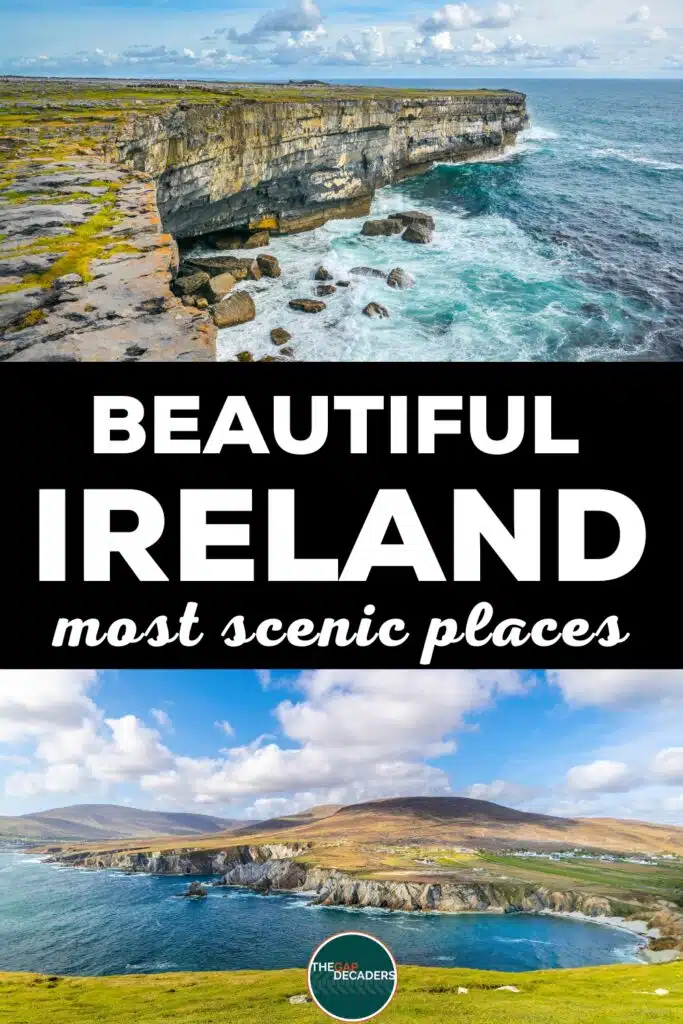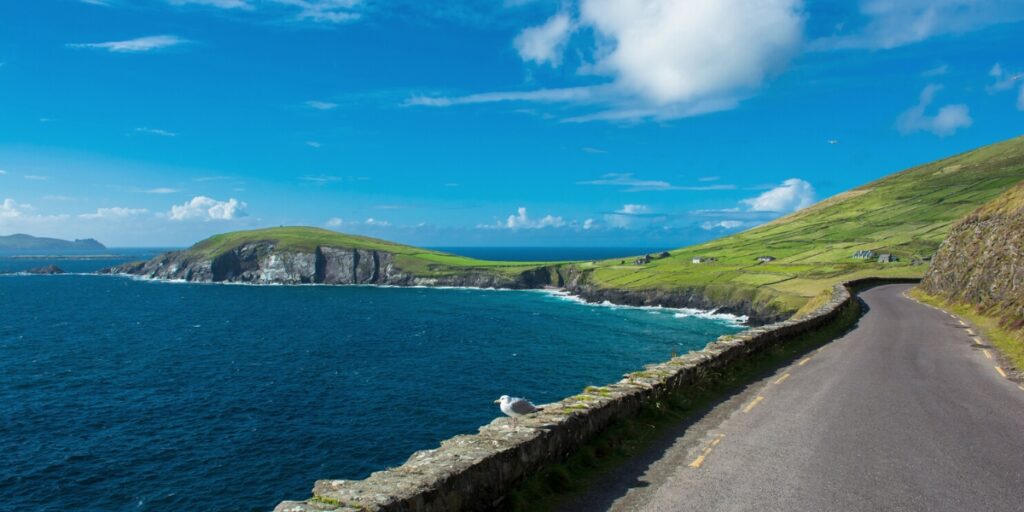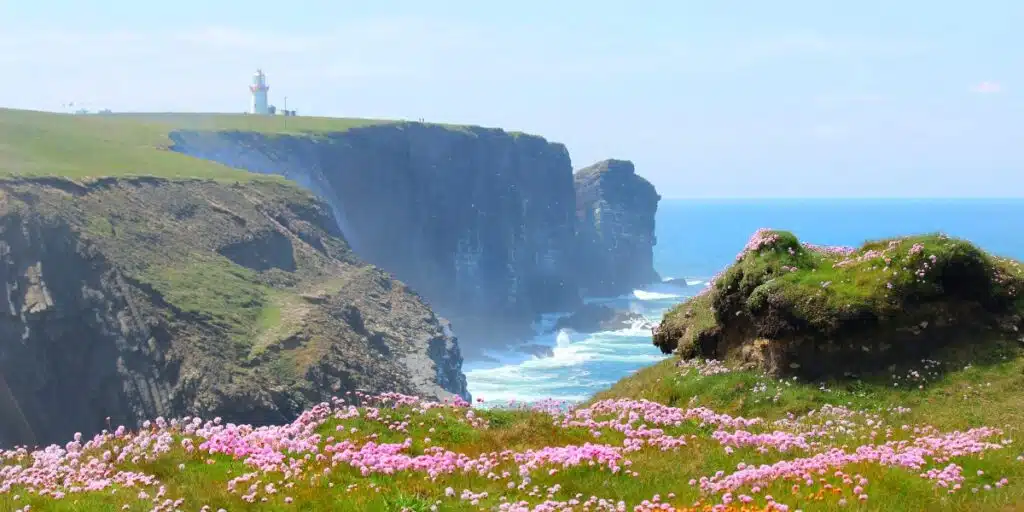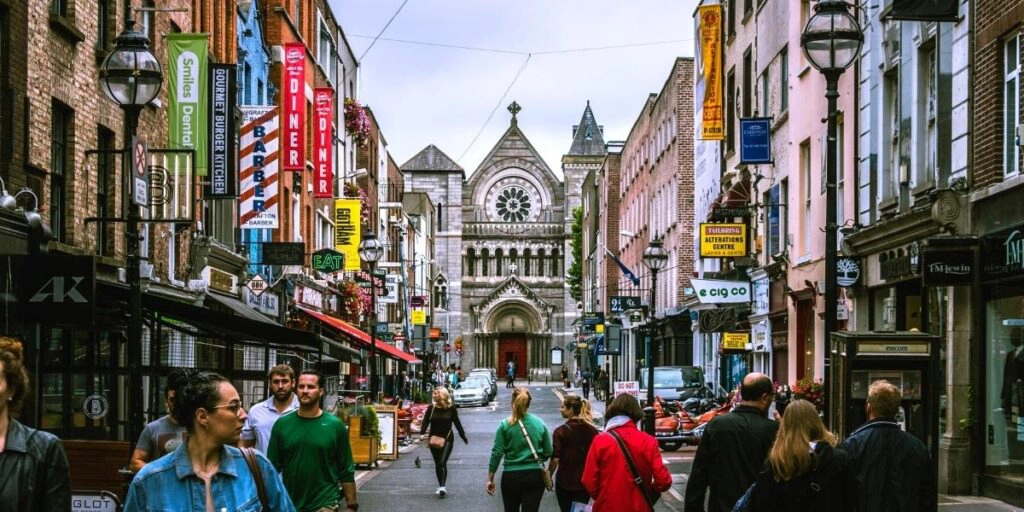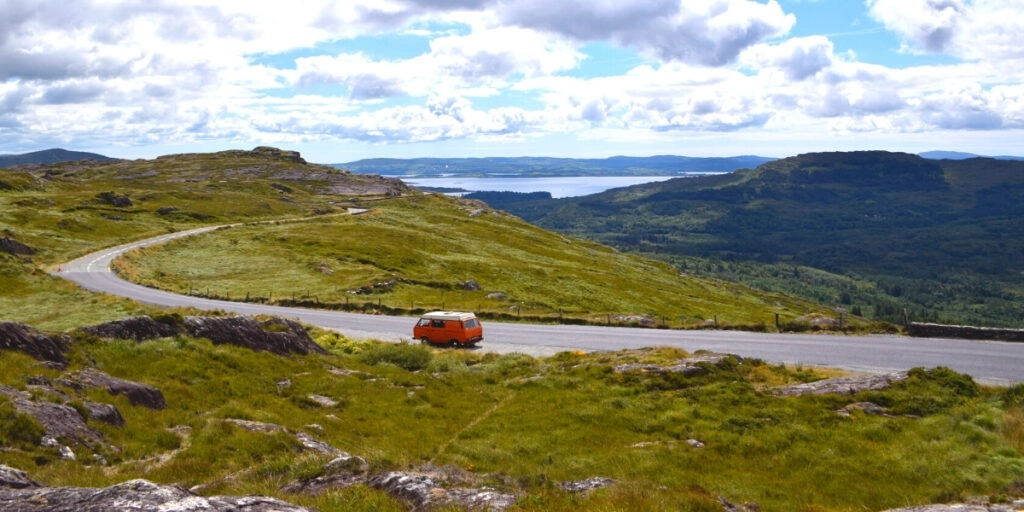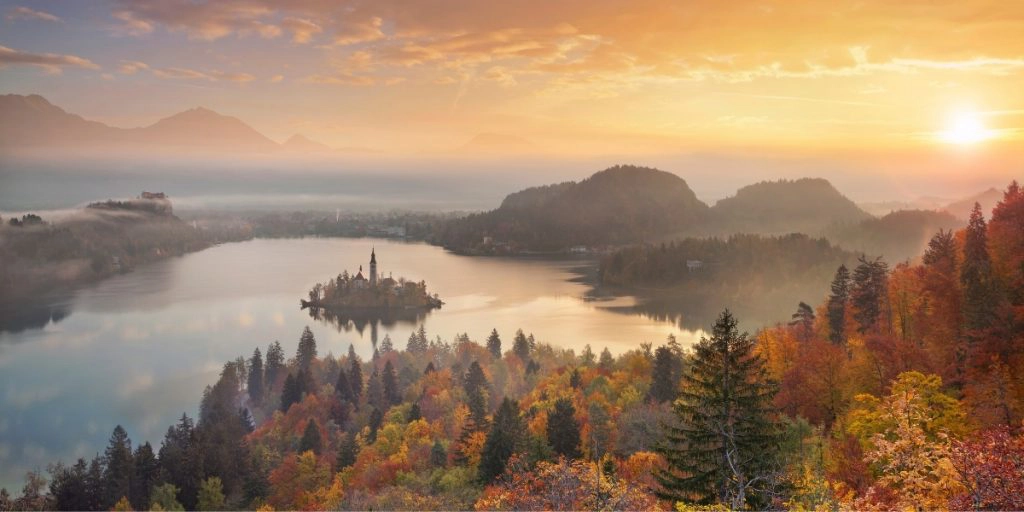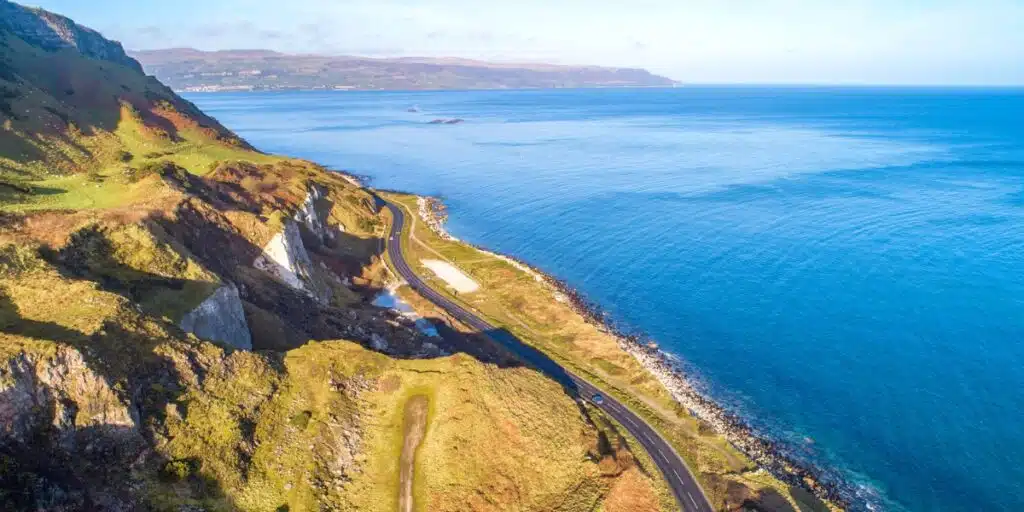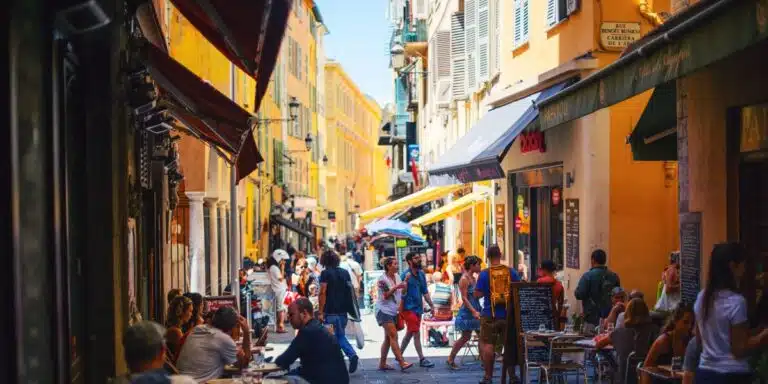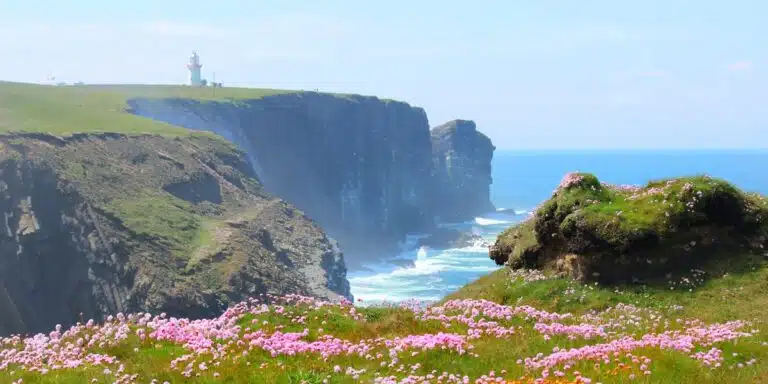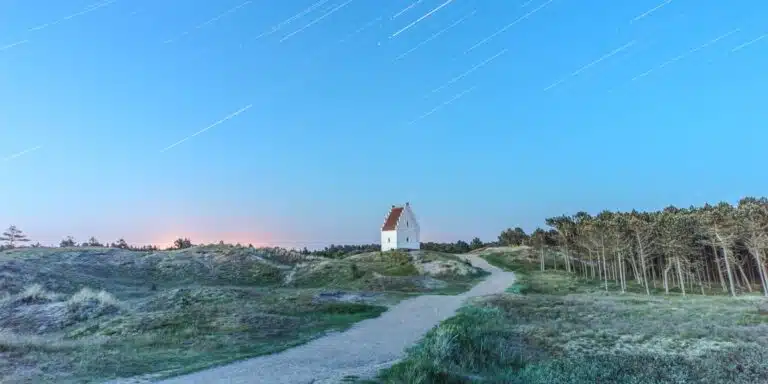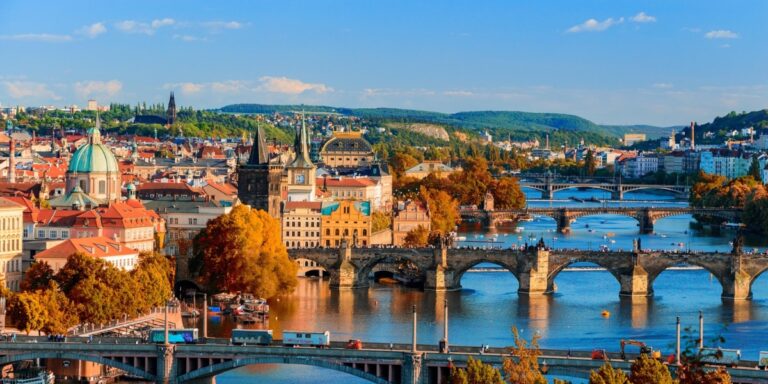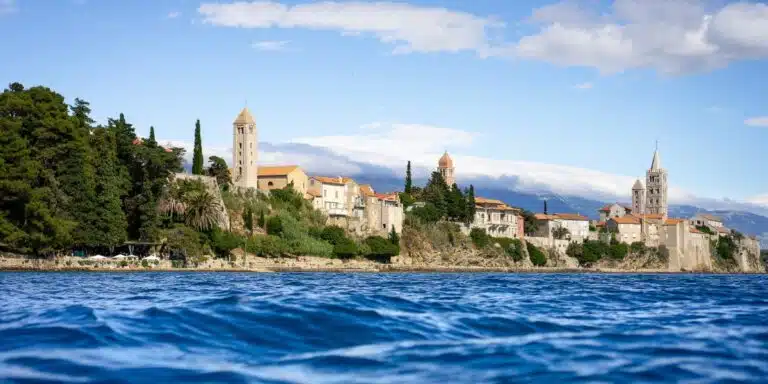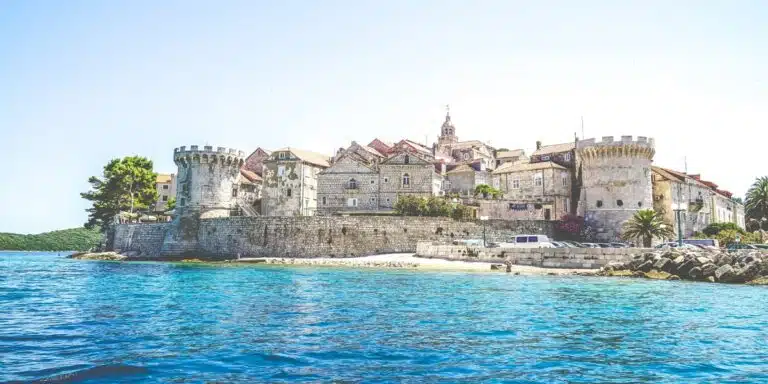This post may contain affiliate links, from which we earn an income.
The Most Beautiful Places in Ireland
Ireland has to be one of the most charming, captivating, and naturally beautiful countries on earth without trying too hard. The beauty of Ireland comes from its raw, wild nature, vast historical sites, and people, and no matter where your Irish adventure takes you, you will almost always come away with long-lasting memories.
Ireland is one of the greenest countries you could hope to visit and has a long stretch of coastline, home to countless beaches and coves – some of which appear to be taken from the Caribbean. It might be a small country, but it certainly packs a punch, and anyone who visits the Emerald Isle always boasts about the tranquility of remote places you can easily find and immerse yourself in.
While narrowing down all the most beautiful places in Ireland is tough, these 22 unmissable spots ooze natural beauty and epitomise scenic Ireland at its very best.
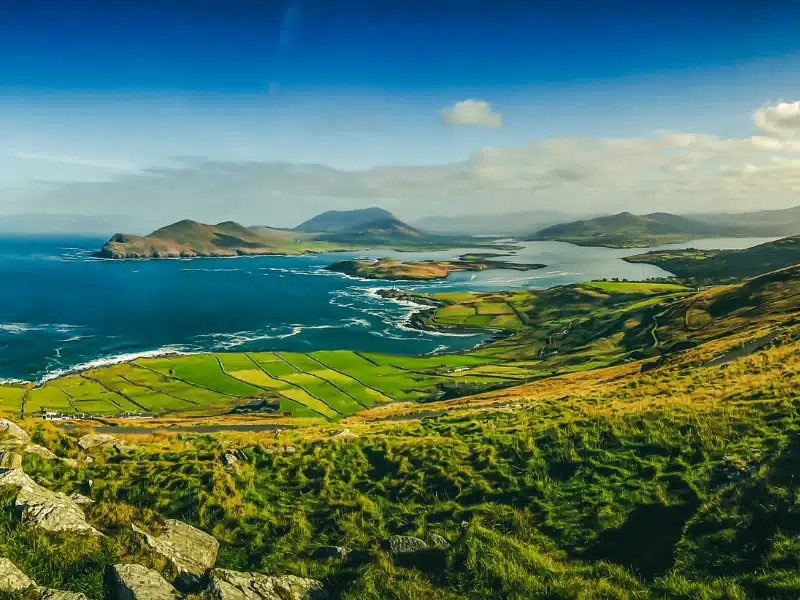
Ireland Trip Resources
Here are the services we use and recommend for traveling in the Ireland;
East of Ireland vs. West of Ireland
Most visitors to the Republic of Ireland will choose to visit either the east or west of the country. Most major road routes in Ireland run from north to south, making traveling down one side of the other easier and quicker.
If you’re short of time and need to decide, here’s a rough guide to what the east and west have to offer!
West of Ireland
The Wild Atlantic Way is one of the most beautiful places in Ireland and neatly encompasses the countless hidden gems to see along the west coast of Ireland in one epic road trip.
Ireland’s famous coastal route begins in County Donegal and finishes in County Cork and is, in fact, the longest defined coastal route in the world at 1600 miles / 2600km.
The west coast is not only one of the most beautiful places in Ireland, but it is one of the most spectacular, so much so that you can easily return here time and time again and be pleasantly surprised.
From the white sand beaches and cliffs of County Donegal to the surf and quaint towns of Sligo and beyond, the Wild Atlantic Way is a stunning region to visit as part of an Irish adventure.
East of Ireland
Ireland’s Ancient East is a region rather than a road trip route, framed by the river Shannon to the west and Irish Sea to the east.
The Ancient East showcases 5,000 years of Celtic and Irish history and national heritage across the soft green landscapes of Wexford, Carlow, Kilkenny, Wickford, Tipperary, Waterford, and twelve other counties.
Where the Wild Atlantic Way is about raw nature and pounding seas, the Ancient East is where the myths and legends of the Emerald Isle come to life.
Make sure you have travel insurance you can trust when visiting Ireland. We recommend True Traveller for their 5-star TrustPilot reviews, variety of cover options, best activities cover as standard, great prices, and excellent service.
West of Ireland
Slea Head, County Kerry
Slea Head, on the Dingle Peninsula, is a stunning place in County Kerry. While many people drive this route or take a bus tour, others cycle or ride a motorbike since the road is ideal for a two-wheel adventure. Ireland is well known for its windy coastal roads, and Slea Head Drive is one of the island’s most enchanting and scenic drives.
The drive starts and ends in the fantastic town of Dingle and takes 1-2 hours to complete; however, this can be a little longer with photo stops. Along the way, you will witness places like Dunquin Pier, Dunmore Head Viewpoint, and Ventry Beach. Plus, you can take a boat out to explore the Blasket Islands from here.
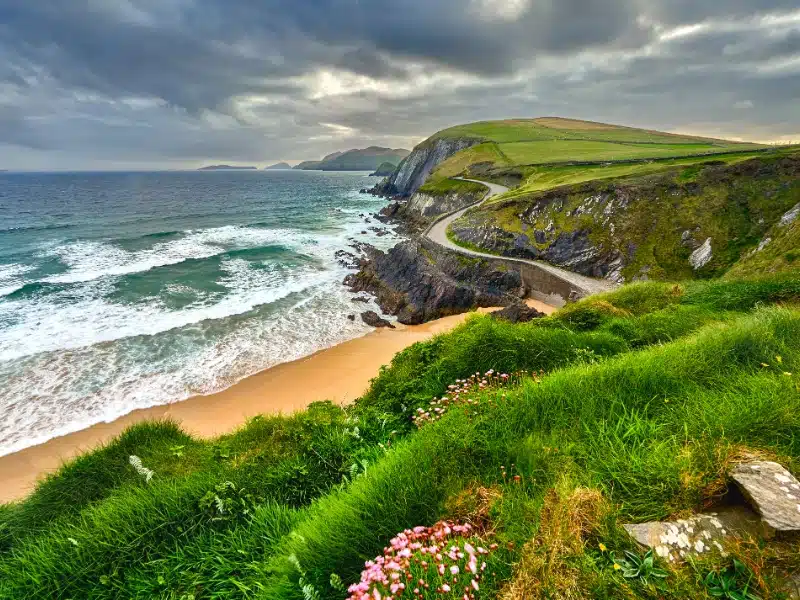
Connemara, County Galway
If you’ve ever seen photos of Ireland’s idyllic white sand beaches, which feature turquoise waters, chances are these are the beaches of Connemara. Dogs Bay, Gurteen Bay, and Mannin Bay are among the most incredible beaches in Connemara and Ireland, but that is not the only reason Connemara is one of the most beautiful places in Ireland.
Connemara National Park is where time stood still, where you can see old stone walls thatched cottages and spot Connemara ponies enjoying the views, and on the edge of the park you can visit the gorgeous Kylemore Abbey and Victorian Walled Garden.
Connemara is one of the most idyllic parts of Ireland to visit because of its natural beauty, history, and culture, and it is a Gaeltacht area where Irish (Gaelic) is still commonly spoken.
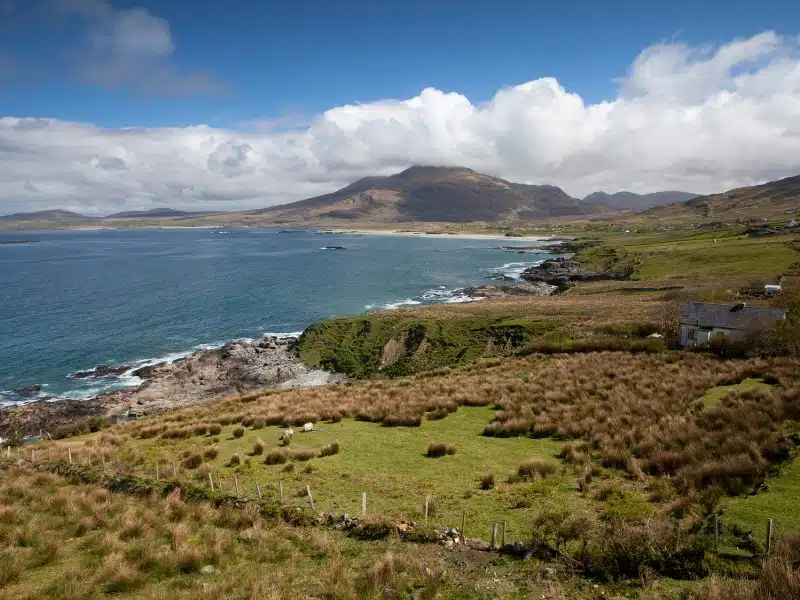
Looking for the best SIM card deals in Europe for your trip? Check out our guide to the best data SIMs in Europe and get the best deal for your trip to Ireland.
Cliffs of Moher, County Clare
The Cliffs of Moher are one of the most stunning sights to behold in Ireland, and the best way to view these enormous cliffs is by boat. The cliffs run for about 8.7 miles / 14km and stand at 214m / 7,021ft, making them the second highest cliffs in Ireland.
The cliffs can be viewed from above, where you can take a stroll along the designated path and admire the sweeping coastal views.
The cliffs are so famous that they have been featured in movies like Harry Potter and the Half Blood Prince, The Princess Bride, and Leap Year, to name but a few.
While they are not the highest cliffs in Ireland, they are certainly the most visited, in part thanks to the many Cliffs of Moher tours from Dublin that are on offer.
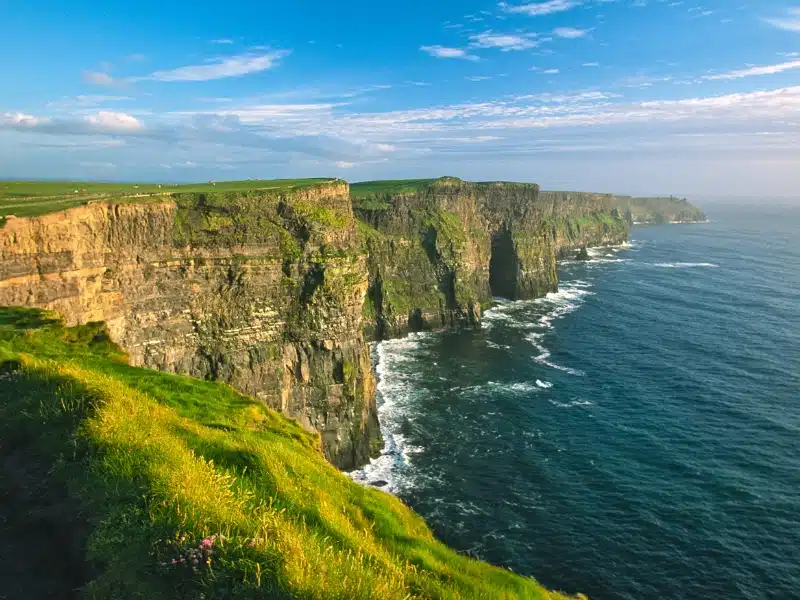
The Ring of Kerry, County Kerry
The Ring of Kerry is undoubtedly one of the most beautiful places in Ireland since it features an array of stunning locations along its route. It is one of the most famous drives for people to undertake in Ireland, and many come from all over the world just to tick this off their Irish bucket list.
Along this 111 miles / 179km route, there are plenty of scenic coastal towns to visit, like Portmagee – gateway to Valentia Island; Waterville – Charlie Chaplin’s holiday destination; and Kenmare – famous for its seafood.
The Ring of Kerry also features wildlife, sparkling lakes, incredible coastal views, and jaw-dropping cliffs, which make it a genuinely unmissable place to experience.
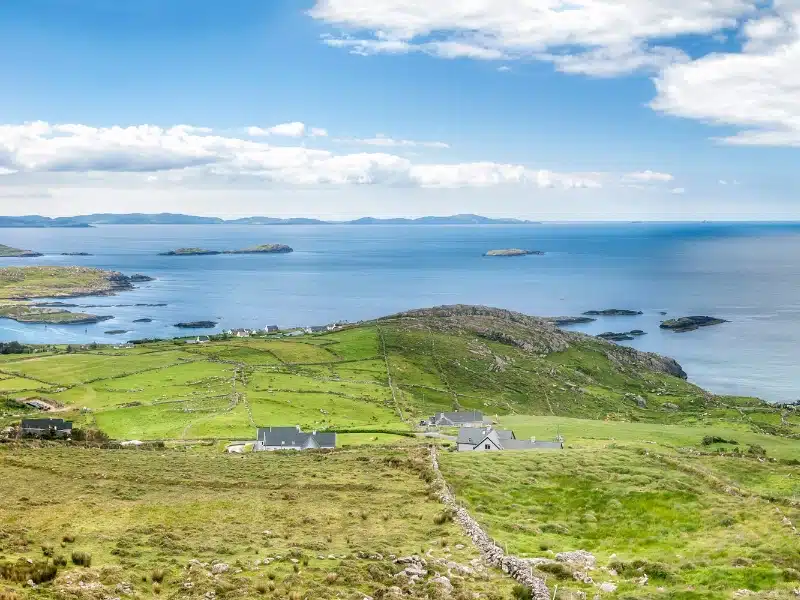
West Cork, County Cork
West Cork is well known for its stunning beauty, so much so that plenty of celebrities have moved here permanently to enjoy their surroundings full-time. Hollywood actress Maureen O’Hara was one of the most notable residents of West Cork, but plenty of famous faces visit this region of Cork regularly.
West Cork is also known for its scenic and colorful villages, gorgeous beaches, old harbors, and idyllic islands like Garnish Island and Dursey Island.
This region is one of the most stunning places to visit and one of the most sought-after places to live in Ireland, so chances are you won’t want to leave West Cork when you see what it offers.
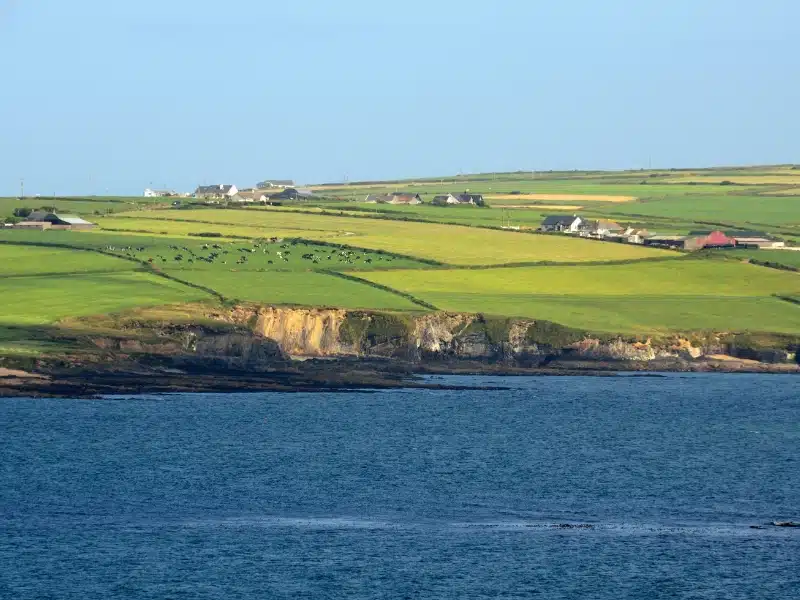
Other Irish Travel Ideas
Inishmore, County Galway
Inishmore, or Inis Mor (Big Island) in Irish, is the largest of the Aran Islands off the coast of County Galway, just a short ferry ride from Doolin. Inishmore is a stunning location that takes you back in time, and the island culture is apparent from the way the locals still live, work, and enjoy themselves, which makes it a fascinating place to see.
Dun Aonghasa Fort clifftop fort offers a stunning insight into the island’s history, while the Worm Hole is a natural pool at the bottom of the cliffs, which is excellent if you are a skilled wild swimmer.
The beauty of Inishmore is undeniable, and it is an unbeatable place to enjoy Ireland’s wild nature and history at its best.

Killary Fjord, County Galway
Killary Fjord is an awe-inspiring sight to see when in Ireland, and it is an excellent place to take a boat tour and witness dolphins, too. It is Ireland’s only glacial fjord, which makes it one of the most remarkable landscapes on the island and can be compared to the smaller fjords of Norway or New Zealand.
Located in Northern Connemara, visiting the fjord is a must when passing through, and it is often considered one of the most breathtaking stop-offs along the Wild Atlantic Way.
The town of Leenane offers a tranquil place to have lunch or a coffee while enjoying views of the fjord, and this is the place to take boat tours out into the fjord on a dry, sunny day.
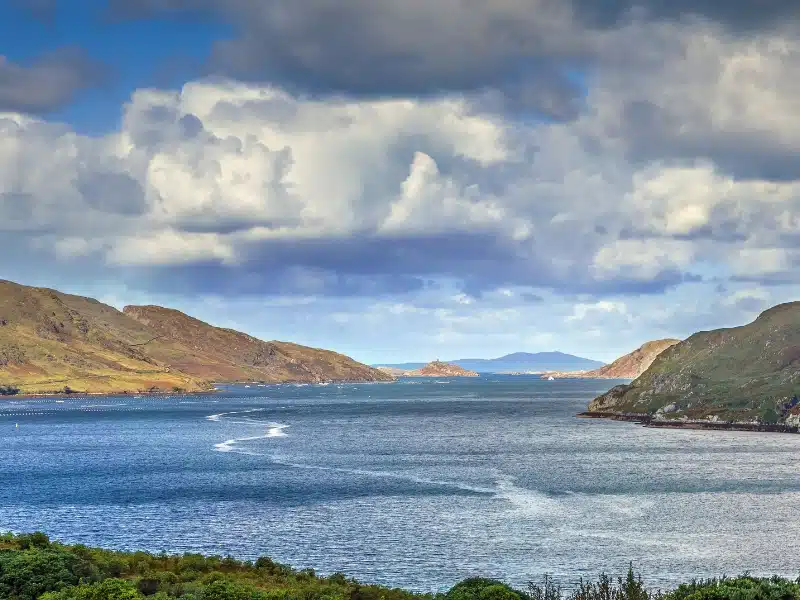
Killarney National Park, County Kerry
Killarney National Park was the first national park in Ireland and is a notoriously beautiful place for tourists and locals. Within the park is an abundance of flora, fauna, and wildlife, as well as glistening lakes, narrow winding roads, and historic sights to see.
The park is also home to a number of Ireland’s most scenic spots including the Gap of Dunloe, a paved mountain pass between MacGillicuddy Reeks and the Purple Mountains; the 15th century Ross Castle, Muckross Abbey, Torc Waterfall, and the Devil’s Punchbowl.
Despite being a stone’s throw from Killarney town – the gateway to the park, Killarney National Park feels a world away from the hustle and bustle. The park’s stunning beauty makes it one of the top destinations for visitors to Ireland, and one of the best ways to get around is by bicycle, which allows you to soak up the sights and nature at a slower pace.
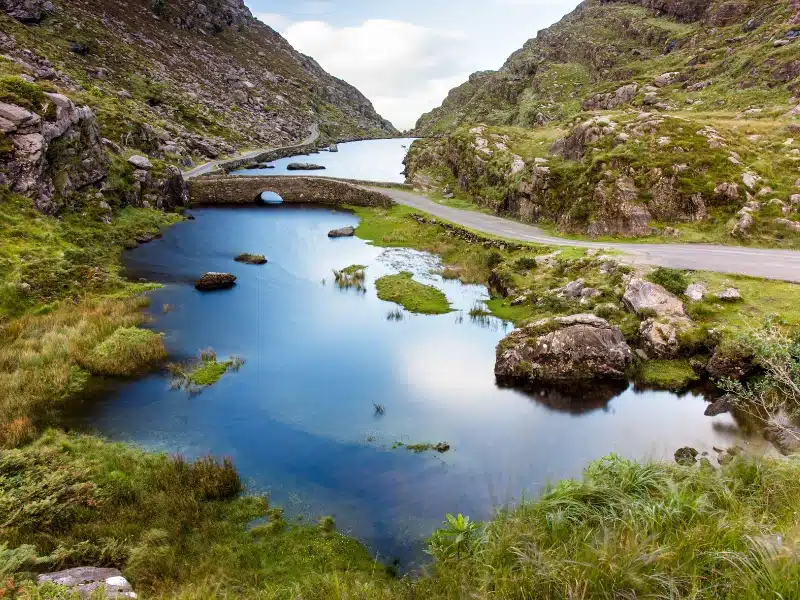
Slieve League Cliffs, County Donegal
While the Cliffs of Moher are more visited than the Slieve League Cliffs in Donegal, the latter are much higher, standing tall at 601m / 1,972ft, making them the highest cliifs in Ireland.
The enormity of these cliffs makes them one of the most stunning sights to witness, and on a sunny day, the contrast of the turquoise waters, white sandy coves, and sheer cliffs is incredible.
These cliffs are even more charming because they are lesser known than their famous counterparts so you won’t find many crowds here, especially in the low season. This is a spectacular place for hiking, photography, or a picnic, but don’t look down and steer clear of the edge if you are afraid of heights!

The Burren National Park, County Clare
One of the most beautiful places in Ireland is the Burren National Park in County Clare. This region is unique because of its karst landscape, which gives it a very otherworldly feel, making it stand out from other parts of the country.
The area is renowned for its numerous archeological findings, unique flora and fauna, and wildlife, making it a popular place for locals and tourists to explore.
For excellent reasons, the European Union designated this stunning area as a Special Area of Conservation. Because of its unique features, it remains one of the most spectacular places in Ireland.
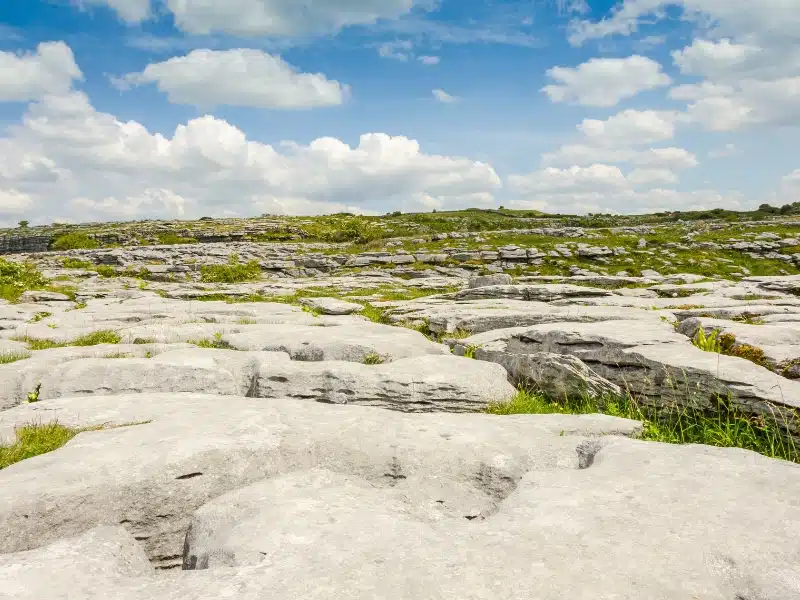
Beara Peninsula, County Cork
The Beara Peninsula in West Cork is a must-see for wild, rugged nature with sweeping views. This stunning area is one of the most overlooked places in Ireland since the Ring of Kerry tends to attract crowds, yet this charming peninsula offers some of Ireland’s most beautiful landscapes.
As one of Ireland’s most compelling locations, the Ring of Beara which circles the peninsula is an unmissable place for nature lovers, wildlife enthusiasts, and, most importantly, those who want to get off the beaten path and see an authentic slice of Ireland.
The peninsula has two jaw-dropping mountain ranges running down its center, the Caha Mountains and the Slieve Miskish Mountains, ending in the Atlantic Ocean, making this an excellent location for hikers and cyclists alike.
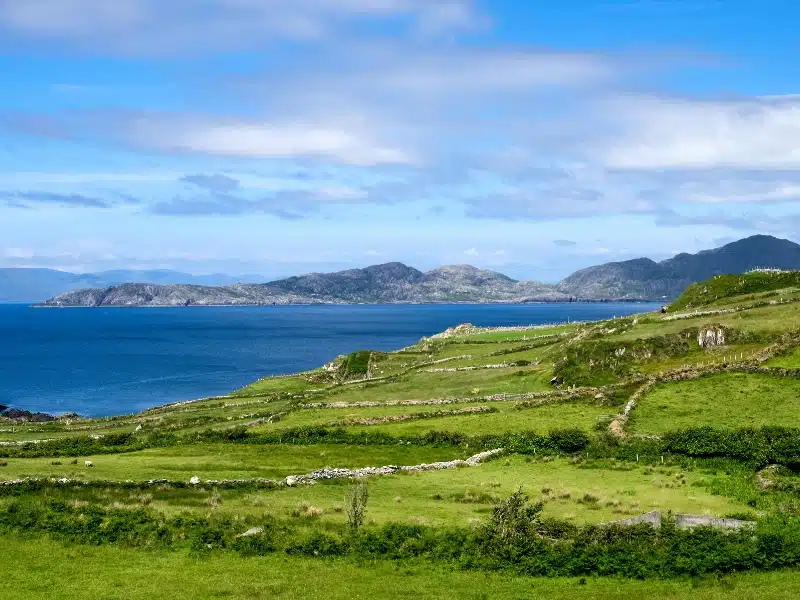
Blarney Castle, County Cork
Blarney Castle is a fascinating destination boasting plenty of history, culture, and mystery. The castle, built on the site of a 10th century wooden structure, is a romantic partial ruin surrounded by breathtaking countryside views, wooded hollows, and a flowing river.
One of the castle’s most famous attractions is the Blarney Stone, which has been kissed by world statesmen, literary giants, and film stars. Legend has it that kissing the stone imparts the gift of eloquence, also known as ‘the gift of the gab’.
The origins of the stone are shrouded in mystery, with many theories, stories, and myths surrounding its creation. Some believe it was a gift from the goddess Clíodhna, while others say it was a reward for saving a drowning witch. There’s even a theory that the stone is a piece of Scotland’s Stone of Destiny, brought back to Ireland by King Cormac McCarthy in the mid-15th century.
Regardless of its origins, the Blarney Stone is a must-see attraction in Ireland. It can be found at the top of the castle, set in the wall below the battlements. To kiss the stone, you must lean backwards (with the assistance of a guide) while holding onto handrails. After kissing the stone, it’s time to put your newly acquired skills to the test. Good luck!
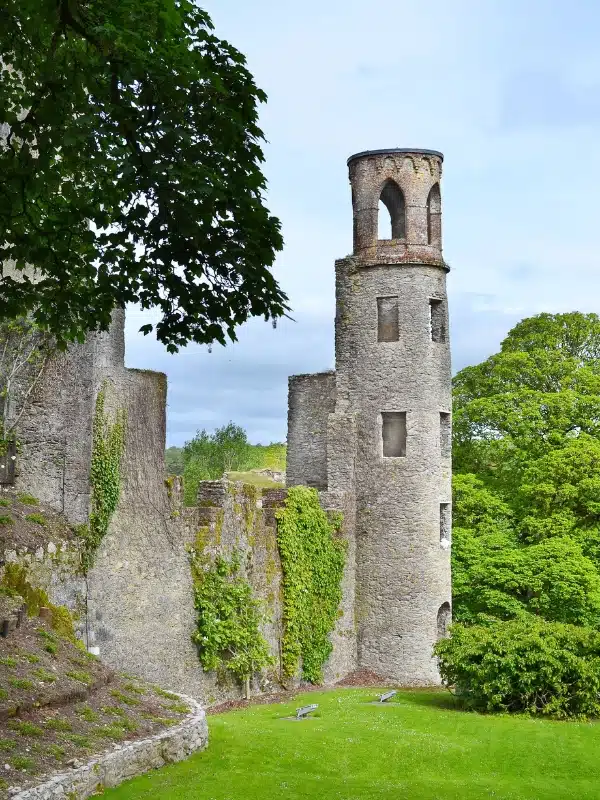
Achill Island, County Mayo
Achill Island not only boasts Croaghaun Cliffs, the highest sea cliffs in Ireland and the third highest in Europe at 688m / 2,257 ft, but the beaches, the historic sites, and the wildlife roaming free make this one of the most magical places in Ireland.
Achill offers stunning views throughout the island, and some top spots to visit include Keem Bay, Keel Beach, and Slievemore deserted village near Dugort, where the remains of almost 100 traditional stone cottages are arranged on either side of an ancient pathway in one of the most sheltered areas of Achill Island.
Achill is a popular spot for locals who enjoy camping, hiking, and cycling, and the local thatched pubs and houses make for a charming Irish photo opportunity. Achill’s raw nature, white sand beaches, and sheer cliffs make this a majestic retreat for those who love to soak up natural Irish surroundings and learn about the culture.
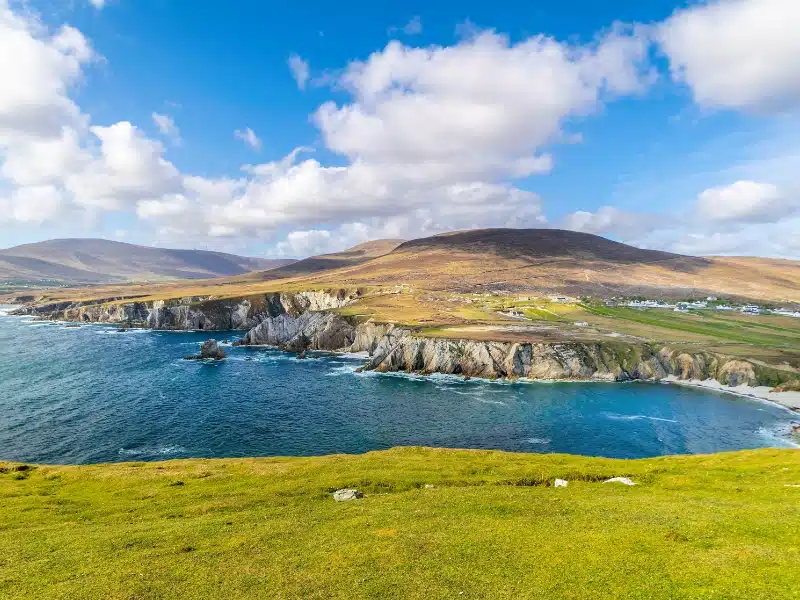
Skellig Michael, County Kerry
Skellig Michael, a UNESCO site, is not just on the list of the most beautiful places in Ireland because it is famous for being a Star Wars location, but this Irish island is steeped in tradition and is known for its iconic shape. The island dates back 370 million years ago and neighbors its inaccessible twin island, known as ‘Little Skellig.’
Skellig Michael is one of the most stunning places in Ireland since it is home to and surrounded by abundant wildlife like puffins, grey seals, and razorbills.
The island is only accessed by boat during the summer months, and visitors need to take a flight of steep cliffside steps leading to a 6th century monastery and beehive huts, which are incredible to witness.
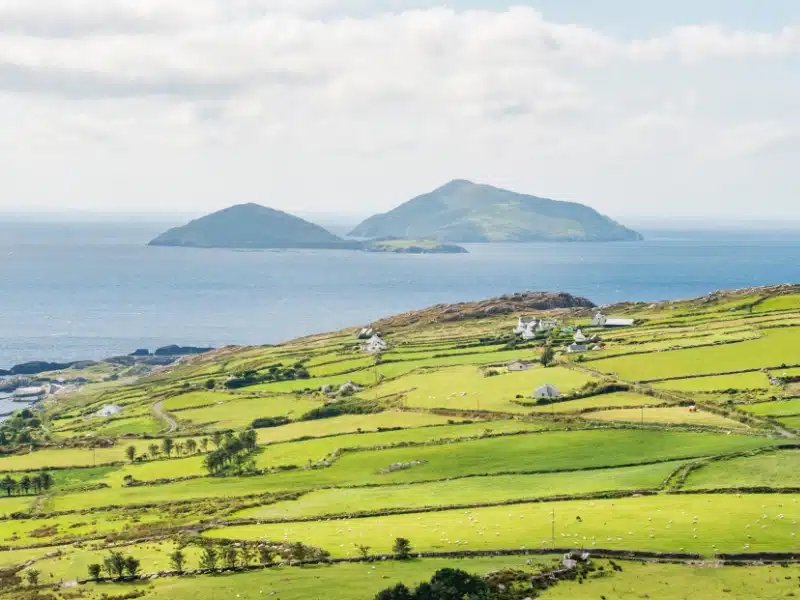
Benbulbin, County Sligo
One of the reasons we find things in life beautiful and captivating is because they are unusual, which is why Benbulbin fits perfectly into this list. Despite seeing photos of this unusually shaped rock formation, seeing it in person and from all perspectives makes for a magnificent experience.
This protected site is a popular place for nature walks, wildlife spotting, and photography, and from the rock, you can view the glorious Sligo coast.
This large flat-topped rock is well known for its shape since there is nothing quite like it in other parts of the country, making it a special place to discover, especially when you discover that it was formed by Irish glaciers during the Ice Age.
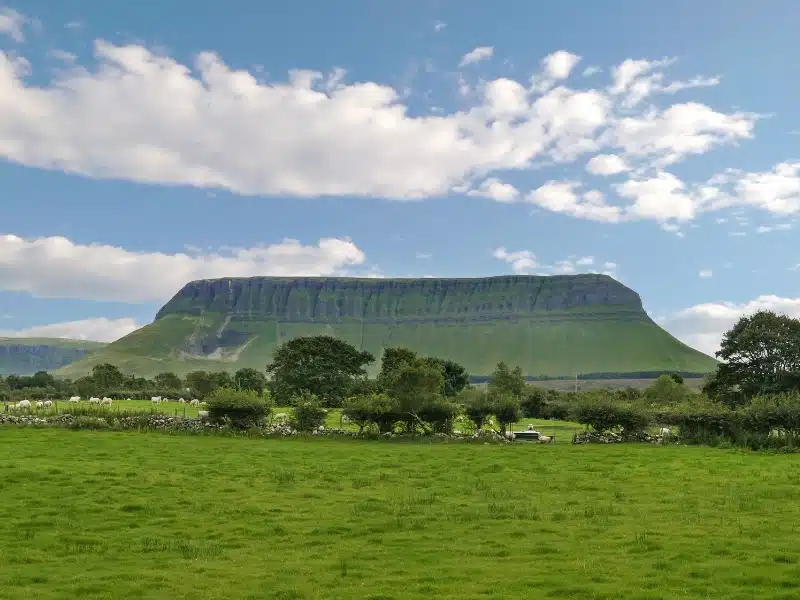
East of Ireland
Hook Lighthouse, County Wexford
The iconic blue and white striped Hook Lighthouse is one of the oldest lighthouses in the world and the second oldest operating lighthouse in the world, after the Tower of Hercules in Spain.
The 13th century lighthouse exudes a unique magic and mysticism that captivates all who visit. Ascend the 115 well-worn spiral steps of the tower and immerse yourself in the thick-walled chamber, where every step is a reminder of the daily rituals of the light keepers who served at this historic landmark.
The view will take your breath away as you reach the four-story high balcony at the top of the tower. The mesmerizing steely blue seas are the graveyard of 1,000 ships, and home to dolphins, seals, and even humpback whales.
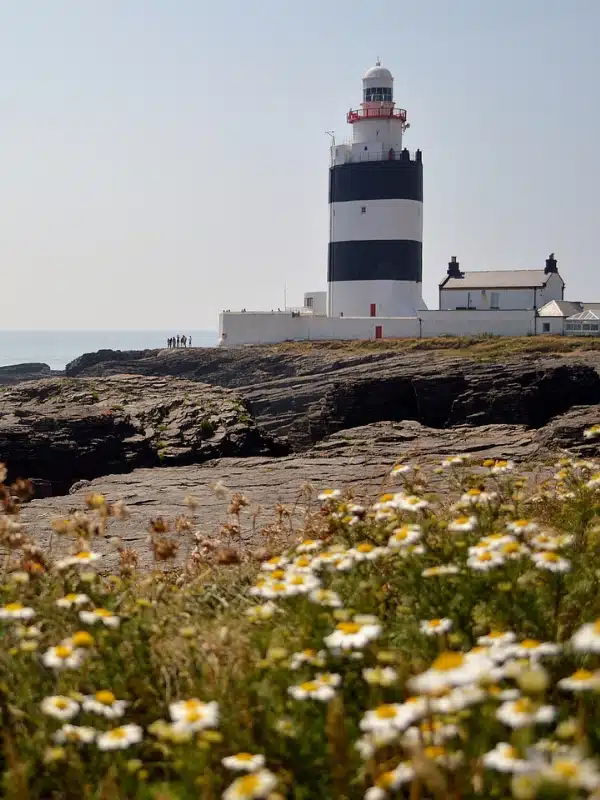
Glendalough, County Wicklow
While the Wicklow Mountains National Park is an extraordinary place to visit in Ireland, Glendalough is one of the most beautiful places within the park, which is a must-see.
This popular hiking area has incredible views and features lakes, round towers, and many other historic sites, which can be spotted while exploring the area on foot.
For Dubliners, this is a common place to get into nature on the weekends, but plenty of tourists love to venture to Glendalough as part of a day trip from the capital when visiting, too. The region is steeped in tradition and has a different, albeit incredible, feel compared to other parts of the country.
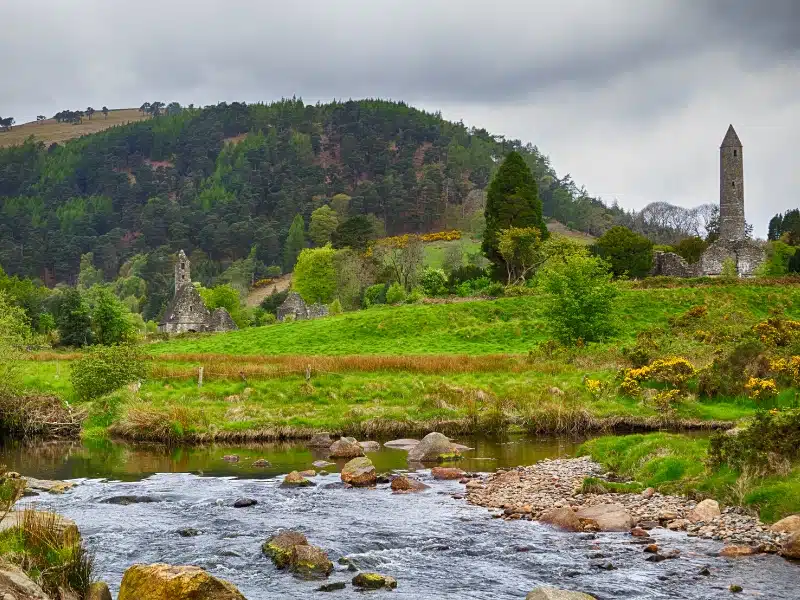
Rock of Cashel, County Tipperary
Located on a breathtaking limestone outcrop in the Golden Vale, the Rock of Cashel holds immense historical significance and boasts the most impressive collection of medieval structures in all of Ireland.
According to local legends, the Rock of Cashel originated in the Devil’s Bit, a mountain 20 miles north of Cashel when St. Patrick banished Satan from a cave, resulting in the Rock landing in Cashel.
Initially the seat of the kings of Munster (Munster being one of the four provinces of Ireland along with Connacht, Leinster, and Ulster), legend has it that St. Patrick himself visited the site to convert King Aenghus to Christianity. In 978, Brian Boru was crowned High King at Cashel and declared it his capital.
In 1101, the site was granted to the church, and Cashel rapidly became one of the most significant centers of ecclesiastical power in the country.
Today, the Rock, silhouetted against the sky and rising above the lush green fields of the surrounding countryside, is an iconic and beautiful Irish landmark.
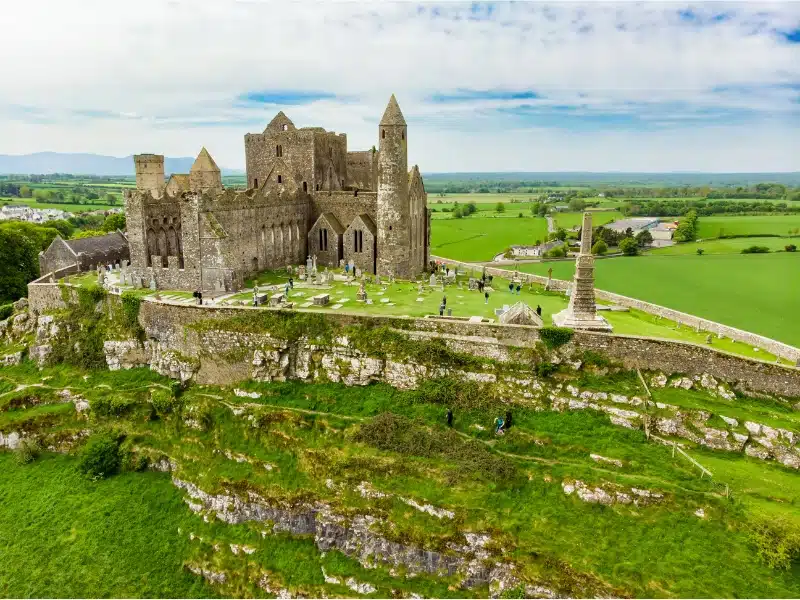
Bray, County Wicklow
Bray, the largest town in County Wicklow, has been recognized as one of the top 14 most underrated travel destinations in the world for March 2023 by TimeOut Magazine.
Known as the ‘Gateway to the Garden of Ireland’, Bray is the oldest seaside town in the country and enjoys fabulous views over the Irish Sea. Only 13 miles from Dublin, Bray makes it a great base from which to explore the east.
Visitors can enjoy the stunning coastline which offers something for everyone. From taking a dip in the waters of Bray’s Blue Flag beach to checking out the spectacular views from Bray Head and walking the magnificent cliff walk to Greystones, there’s no shortage of outdoor activities.
Bray Head has even been designated a Special Area Amenity Order which recognizes its outstanding natural beauty, and deservedly so!
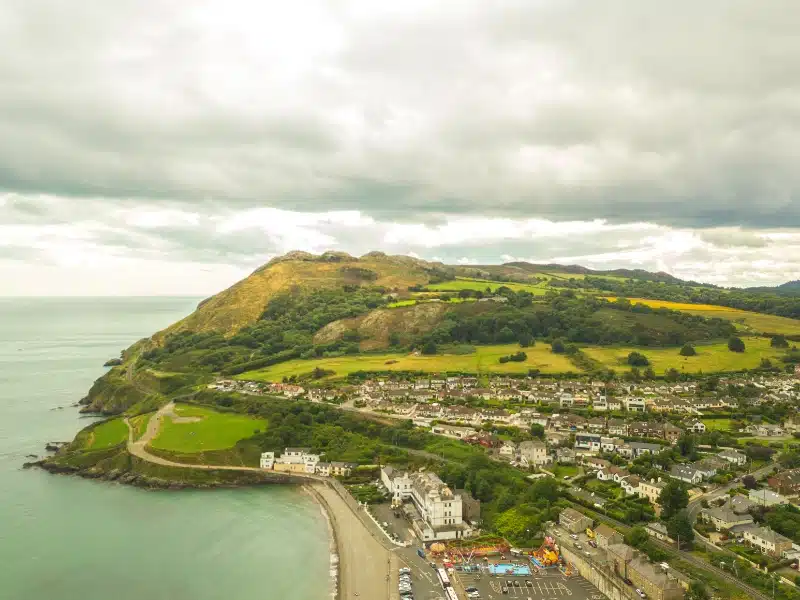
Hill of Tara, County Meath
One of the most scenic places in Ireland, the Hill of Tara is an ancient ceremonial and burial site that was the inauguration place and seat of the High Kings of Ireland in the Early Christian Period. In fact, 142 kings were crowned on this spot, where it is said that you can see half the counties of Ireland on a clear day!
Tara is home to a range of monuments and earthworks dating from the Neolithic to the Iron Age, including a passage tomb called the ‘Mound of the Hostages’. There is also a standing stone believed to be the Lia Fáil or ‘Stone of Destiny’, one of the four legendary treasures of the Tuatha Dé Danann which stands proudly on the monument known as An Forradh.
It is known that St Patrick himself went there in the fifth century. As Christianity achieved dominance over the following centuries, Tara’s importance became symbolic. Its halls and palaces have now disappeared and the only part of this ancient landscape to remain are earthworks.
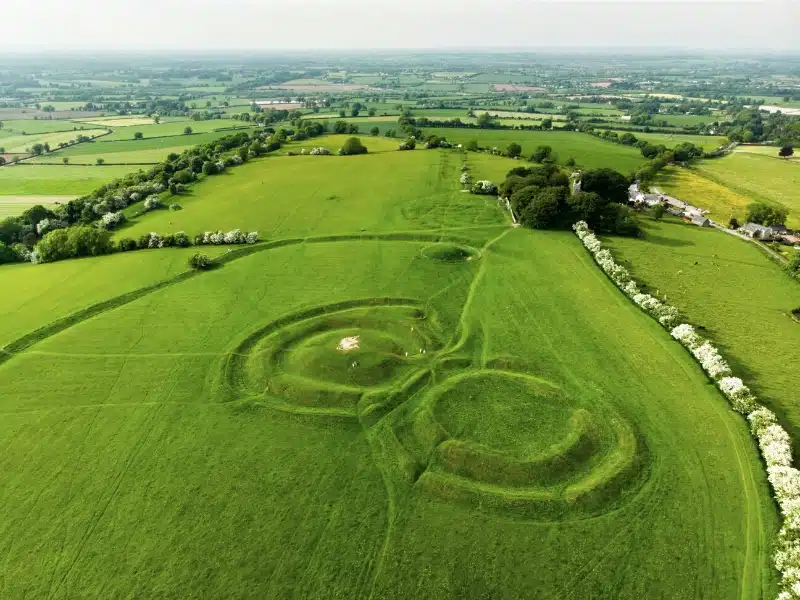
Kilkenny, County Kilkenny
Kilkenny, a medieval city located in Ireland’s Ancient East, perfectly blends small-town charm with big-city buzz. Just 90 minutes from Dublin, Kilkenny is known as the ‘Marble City’ due to the many buildings constructed with the local Kilkenny stone.
During the day, visitors can immerse themselves in Viking and medieval history by visiting showpieces such as Rothe House, Black Abbey, and the Medieval Mile Museum. They can also take a guided tour of Smithwick’s Brewery and sip on Ireland’s oldest ale or admire the design exhibitions at Kilkenny Design Centre or Kilkenny Art Gallery.
As the sun sets, Kilkenny comes alive with cracking trad music sessions, historic pubs full of Irish craic (which means enjoying social activity and having a good time), and some of the best festivals on the island of Ireland. Whether you’re seeking culture, history, or a lively atmosphere, Kilkenny has it all.
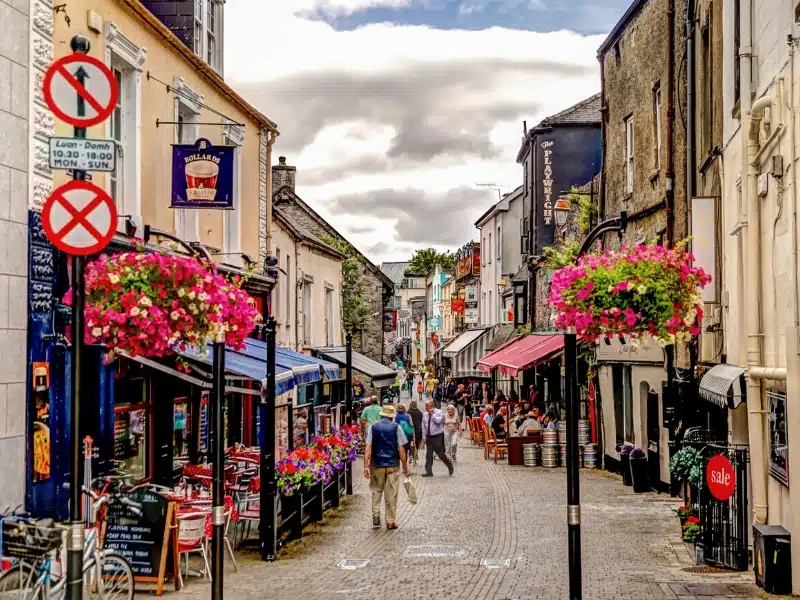
Brú na Bóinne, County Meath
The UNESCO World Heritage Site of Brú na Bóinne is Ireland’s richest archaeological landscape, surrounded by Irish countryside within a bend in the River Boyne.
Brú na Bóinne is famous for the spectacular prehistoric passage tombs of Knowth, Newgrange and Dowth which were built around 3200 BCE. These ceremonial structures are among the most important Neolithic sites in the world and contain the largest collection of megalithic art in Western Europe.
In Irish mythology, Newgrange is described as a portal to the Celtic Otherworld and a dwelling of the divine Tuatha Dé Danann, a supernatural mythological race thought to represent deities of pre-Christian Gaelic Ireland.
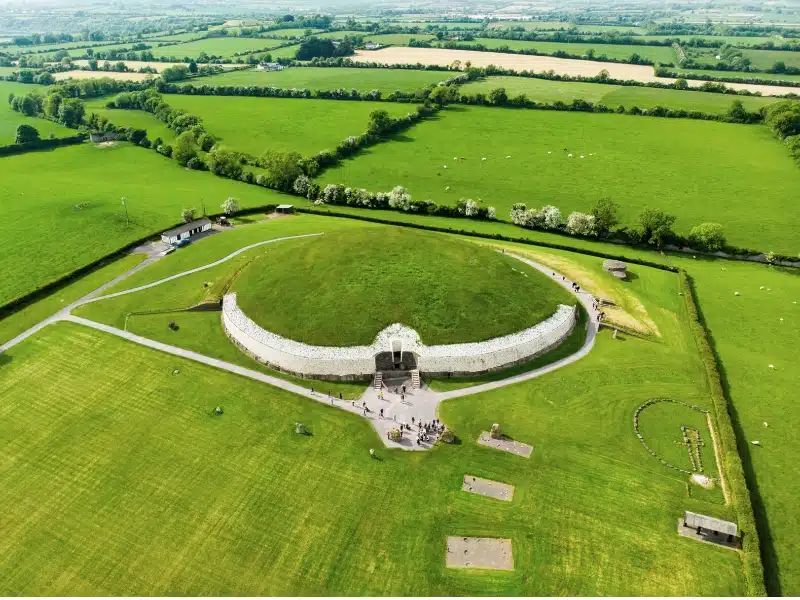
Ireland FAQs
Which is the most beautiful part of Ireland?
That’s debatable and very much depends on the old adage ‘beauty is in the eye of the beholder’! We love the west coast for its drama and wilderness, especially around the Iveragh Peninsula, and Derrynane Beach is really special.
What makes Ireland beautiful?
Where to start? The people, for their legendary hospitality and craic, the gorgeous Irish scenery made lush by the rain, and the myths, literature, music, and cuisine of its eclectic culture combine to make Ireland beautiful.
What is the #1 thing to see in Ireland?
Is that a trick question? By visitor numbers, the top attraction in Ireland is the Guinness Storehouse in Dublin. It’s certainly an awesome place to visit and a pint of the black stuff in the bar at the top of the storehouse is a memorable moment, especially at sunset, but it’s not our top thing to see in Ireland.
Our numer one thing to see in Ireland would be the incredible Giant’s Causeway on the Antrim Coast of Northern Ireland, the top bit of the island of Ireland.
But if we’re talking about the Republic of Ireland (not southern Ireland as some people call it), then it really has to be Slieve League Cliffs in Donegal for their underdog status, because they’re actually bigger and more impressive than the Cliffs of Moher but way less visited.
RELATED POST: Causeway Coastal Route: The Best Road Trip In Ireland?
Which coast of Ireland is the prettiest?
The south west coast has to be one of the prettiest places in Ireland – it’s softer, greener, and way less wild and dramatic than the west coast.
What is the best time to go to Ireland?
Ireland’s weather is notorious for being unpredictable, but to have the best chance of sunny and dry days, it is best to visit in the summer months.
To beat the crowds, however, consider visiting Ireland in the shoulder seasons of May or September, when the weather is still good but the peak season has not set in.
Looking for more travel inspiration? Check out these top posts…
20 Best Cities In France To Visit & Fall In Love With!
Best Things to Do in Ireland: 34 Amazing Highlights
Beautiful Denmark: 11 Best Hidden Gems
Prague One Day Itinerary + Map, Tips & Guide
Most Beautiful Places in Croatia: 17 Scenic Places to Visit
Best Cities in Croatia for an Amazing Visit!
Love it? Pin it!
